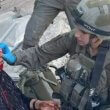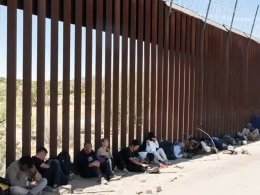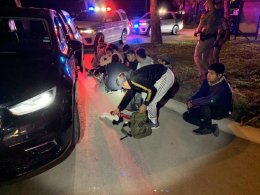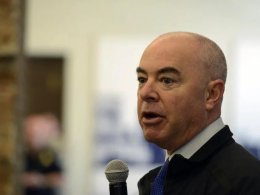The mainstream media is crediting President Biden for authorizing a U.S. drone strike that killed longtime al Qaeda leader Ayman al Zawahiri over the weekend, in sharp contrast to how the press attacked then-President Trump after he authorized operations to kill the leaders of two U.S.-designated terrorist organizations in 2019 and 2020.
Biden on Monday announced the death of Zawahiri, who had been the top leader of al Qaeda since 2011 and before then served as Osama bin Laden's second-in-command.
"Justice has been delivered, and this terrorist leader is no more," Biden said in his televised announcement. "We made it clear again tonight that no matter how long it takes, no matter where you hide, if you are a threat to our people, the United States will find you and take you out."
Zawahiri was widely considered both the intellectual and ideological force behind al Qaeda, with some experts dubbing him the "operational brains" behind the 9/11 terrorist attacks.
Virtually all mainstream media outlets reported on Zawahiri's death and Biden's subsequent comments. The coverage was largely neutral or positive, with networks, news sites, and newspapers reporting what happened and crediting Biden for ordering the drone strike.
Many also portrayed the operation as a unifying moment that helped close the chapter on the War on Terror.
CBS, for example, turned to a live shot of One World Trade Center in New York City after broadcasting Biden's address.
"We leave you with a look at lower Manhattan and One World Trade Center," said host John Dickerson. "All those that plotted the attack are either dead or captured when [One World Trade Center] stands as the tallest building in the Western Hemisphere, a reminder of the resilience of New York City and the American people."
CNN chief media correspondent Brian Stelter highlighted Dickerson's comments and described Zawahiri's death as "a bookend to the 9/11 era." The headline for his Monday newsletter was a Biden quote: "Justice has been delivered."
CNN added that the strike "hands Biden a political win."
MSNBC's "Morning Joe," meanwhile, opened its show on Tuesday with a mash-up of Biden and former President Obama vowing retribution against terrorists. Trump was absent from the mash-up — as was former President George W. Bush.
On ABC, "The View" cohost Joy Behar responded to a clip of Biden's announcement by praising the president.
"He's like Liam Neeson" in the "Taken" series, she said, before quoting a famous line from the movie: "I will find you, and I will kill you."
Despite the praise and positive portrayal, however, some outlets, including Just the News, noted experts were arguing the operation highlighted problems with Biden's decision last year to withdraw all U.S. military forces from Afghanistan.
Biden said in his remarks that Zawahiri was living and killed in downtown Kabul, the capital of Afghanistan, where he moved after the U.S. withdrawal and countrywide takeover by the Taliban, an Islamist group allied with al Qaeda.
Biden seemed to use the strike to defend his withdrawal as a success, while analysts and former officials argued Zawahiri residing in Kabul rather than hiding in a discreet location was proof the U.S. withdrawal paved the way for Afghanistan to become a safe haven for al Qaeda.
Some network morning shows on Tuesday asked White House National Security Advisor Jake Sullivan in interviews to respond to such criticism, but other journalists appeared to echo Biden's defense of the withdrawal.
"This time last year, President Biden was pulling troops out of Afghanistan," said ABC reporter Cecilia Vega. "At the time, the White House faced pushback for saying that it would continue to be able to hunt down and track terrorists down in Afghanistan after American troops were gone. They have shown tonight that is still a possibility."
The Zawahiri operation came six months after Biden directed the U.S. raid in Syria that killed ISIS leader Abu Ibrahim al Hashimi al Qurayshi.
The mainstream media's coverage similarly credited Biden for ordering and overseeing the raid. Some journalists noted the ISIS strike could be a boon for his presidency.
Just the News didn't find examples of the nation's most prominent media outlets criticizing Biden's conduct before, during, or after the operation. Nor did Just the News find journalists at these outlets questioning Biden's judgment or warning of the consequences of his decision to greenlight the raid.
In sharp contrast, prominent, mainstream outlets chastised Trump for his conduct and judgment when he ordered a similar operation in Syria in October 2019 that killed al Qurayshi's predecessor, Abu Bakr al Baghdadi. Journalists with major platforms also downplayed and questioned Trump's decision to approve the raid, in many cases seemingly trying to avoid giving him credit.
There was a long list of such press coverage within 24 hours of news breaking that Baghdadi was dead.
NBC correspondent Hallie Jackson, for example, said the raid came "at a time when critics have really raised questions about [Trump's] policy [to withdraw forces from] Syria."
MSNBC's Chris Jansing added, "The raid that killed Baghdadi is both a military and political victory for the Trump administration, but some officials point out that it may say as much about the flaws in Trump's foreign policy as it does about how well it can work."
She then referenced a New York Times report saying military commanders rushed the timing of the raid while U.S. forces were still on the ground. "So do you agree with intelligence and counterterrorism officials who are cited by the Times as saying this raid occurred largely in spite of President Trump's actions, not because of them?" Jansing asked a guest.
Some journalists questioned whether killing Baghdadi was even a victory for Trump.
"The president has really been under tough scrutiny — the impeachment inquiry, members of his own party criticizing him for his decision in Syria," noted ABC anchor Eva Pilgrim. "Is this a big victory for the president?" she asked network correspondent Terry Moran, who downplayed the event as routine.
"It is a big victory for the president," said Moran. "It's also the kind of thing that Americans expect presidents to accomplish ... This is the kind of presidential leadership that people do expect."
Meanwhile, MSNBC guest host Yasmin Vossoughian asked MSNBC military analyst Jack Jacobs whether Trump's operation would actually strengthen ISIS.
"I wonder here if this type of killing only reinforces the ideology of Baghdadi's followers and in fact strengthens it?" she asked.
"Well, it doesn't make it any easier for those of us who want to destroy the organization completely," Jacobs responded.
On CNN, host Jake Tapper expressed concern that Trump was too transparent about the operation in his remarks to the public.
"Were you concerned at all, listening to that, whether he was giving too much information?" Tapper asked a panel. "I mean, I'm a journalist, I want it all, but I saw some grimaces around this table."
Tapper also falsely claimed Trump didn't thank his top intelligence officials and said the president was "bending over backward to thank [Russian President Vladimir] Putin for allowing the U.S. to use its airspace for the operation."
Several other journalists noted that Trump thanked Russia, in an apparent nod to the now-debunked allegations that Trump's campaign colluded with the Russian government to win the 2016 presidential election.
Media outlets such as CNN and MSNBC also criticized Trump's remarks on the raid, in which he said al Baghdadi died "like a dog" and was a "sick and depraved man," as being "shocking" and "un-American." MSNBC's Joe Scarborough said Trump "sounded like Saddam Hussein after torturing people."
The nation's most prominent media outlets responded similarly with their coverage in January 2020, when Trump ordered an operation that killed Iranian Gen. Qassem Soleimani. Many experts believe Soleimani was the second most powerful Iranian official behind Supreme Leader Ali Khamenei.
Soleimani was sanctioned by the U.S. for his role heading the Quds Force of Iran's Islamic Revolutionary Guard Corps. In that role, he was responsible for the deaths of hundreds of U.S. soldiers in Iraq, according to the Pentagon. The U.S. government has designated both the Quds Force and the entire IRGC as terrorist organizations.
Shortly after Soleimani's death, mainstream media outlets such as NBC and NPR questioned whether the U.S. strike was legal, portraying Trump's decision as an act of belligerence. CNN's John Berman referred to "the murder, the assassination of General Soleimani," adding it occurred as Trump was facing impeachment proceedings.
Many media outlets speculated that Trump may have timed the military strike to distract from his expected impeachment trial.
It appears no journalists at these same outlets have suggested Biden's strike on Zawahiri was meant to distract from his historically low approval rating just three months before the midterm elections.
Regarding legality, press outlets noted the U.S. didn't have a status of forces agreement (SOFA) authorizing the presence of U.S. troops in Iraq, where Soleimani was killed, at the time of the strike. No such arguments are currently being made about the U.S. not having a SOFA with Afghanistan.
Several journalists also referred to Soleimani as "iconic," "revered," "inspirational," and a "military genius."
Time even published a story titled, "How to talk to your kids about the situation with Iran," in which Iran is portrayed as a victim and the U.S. as the aggressor — a media portrayal that was common following the strike.
Several journalists also said the Soleimani military strike would stoke tensions between the U.S. and Iran and potentially lead to war.
CNN correspondent Arwa Damon characterized the operation as "fairly brazen, fairly audacious to a certain degree, to be taking out someone of such significance at a time when there is such tension in the region."
"Iran vowing retaliation amid fears the two nations are on the brink of an all-out war," said NBC's Hoda Kotb. "Oil prices already skyrocketing." Network anchor Lester Holt asked later whether it's "a more dangerous world" after Soleimani's death.
The headline of Stelter's first newsletter following the strike was "War Footing." He later wrote it was "patriotic" to wonder "if the public is being manipulated into a wider war" and "to hold our leaders accountable."










